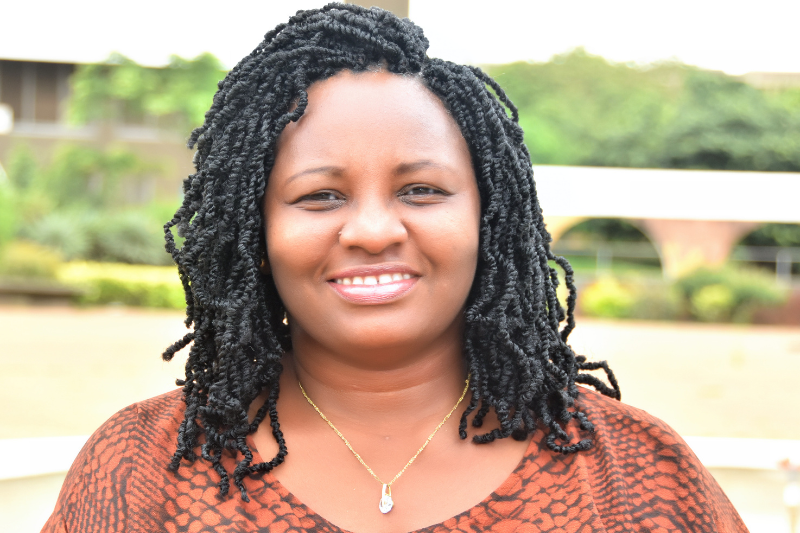
By Meeri Kim
Growing up as a young girl in Lagos, Nigeria, Nkem Torimiro had a dream of becoming a doctor to save lives. But she hit a bump in the road after high school, when the University of Port-Harcourt offered her admission to study botany instead of medicine. She accepted the offer, but with her heart still set on a career in human health.
“It was during my final year while working on a project on isolating bacteria from a diseased plant that I got fascinated by the world of microorganisms,” says Torimiro. “Subsequently, I furthered my graduate studies in microbiology, and it has been a worthwhile experience ever since.”
She realized that expertise in microbiology — and specifically, infectious diseases — could lead to a career that would help fulfill her childhood aspirations. After graduating with a B.Sc. in Botany, Torimiro received her M.Sc. and Ph.D. in Microbiology as well as her Master’s in Public Health (MPH) from Obafemi Awolowo University. Now, as Acting Head of the Department of Microbiology at Obafemi Awolowo University, Torimiro specializes in medical and public health microbiology, detection of infectious agents, and antimicrobial resistance.
She was awarded three patents by the Federal Republic of Nigeria for research innovations that leverage nanotechnology to solve pressing issues in medicine and agriculture. One of her inventions is a nanoparticle-based biosensor that can detect the onset of post-harvest spoilage in fruit before it becomes evident to the naked eye. For example, fruit handlers cannot see the signs of early-stage deterioration that will lead to their produce exhibiting visual symptoms of quality loss during storage — by which point they become unsellable. The biosensor uses a solution of Bacillus subtilis-synthesized silver nanoparticles, which are highly sensitive to the gas metabolite released by many types of fruit when undergoing deterioration. Her invention is a simple and environmentally safe way to ensure that timely actions can be taken before spoilage occurs.
“Food insecurity is on the high side in Nigeria and most sub-Saharan African countries, not just because food production levels are low, but because more of what is being produced is usually lost to post-harvest spoilage,” she says. “Hence, it is highly important not only to grow more food but also to save what is grown.”
Currently, her laboratory is looking for means of addressing antibiotic resistance in infectious pathogenic bacteria. She is also passionate about global health security and advocates for the safe, secure, and responsible use of biological agents. Torimiro holds professional certifications in Biorisk Management, Biosecurity, and Biological Waste Management from the International Federation of Biosafety Associations (IFBA).
As part of a research team based in the United States and Nigeria, Torimiro is also working on a project funded by the Feed the Future Innovation Lab for Food Safety to mitigate and prevent household foodborne illnesses in Nigeria.
“Africa has the highest prevalence of foodborne disease globally, with 2,420 cases per 1 million people occurring every year,” she says. “But most of the research on food safety doesn’t look at households, which is where foodborne disease often originates from, especially in Nigeria and other resource-poor settings.”
She serves as the microbiologist of the interdisciplinary team, which is co-led by Andrea Bersamin, professor of biology and wildlife at the University of Alaska Fairbanks, and Bolanle Otegbayo, professor of food science and technology at Bowen University. Her role focuses on environmental sanitation assessments, such as isolating and identifying pathogens from food contact surfaces and non-food contact surfaces in households.
The project, targeting Nigerian families with children under five years old, aims to understand what factors and conditions make households vulnerable to food safety risks. Torimiro and her colleagues are now in the final stages of the project, which involves a participatory approach and cross-sector collaboration with key stakeholders, including mothers, to prioritize programs and policy actions to improve household food safety.
From her perspective, the biggest challenge in food safety is that people don’t take it seriously enough as a major public health problem. Even the United Nations Sustainable Development Goals (SDGs) — which tackle global issues like hunger, clean water, and climate change — do not include food safety, despite the estimated 420,000 deaths from foodborne illness every year.
“Most times people are reactive, and when it comes to food safety, we don’t prepare ahead. Only when there is an undesirable event, that’s when people mobilize to look for solutions,” Torimiro says. “But planning efforts should be intensified towards prevention, and to do that we need to start addressing food safety from farm to fork.”
Meeri Kim is a freelance writer with the Feed the Future Innovation Lab for Food Safety. The Innovation Lab is one of a network of 20 such labs led by U.S. universities under Feed the Future, the U.S. government’s global hunger and food security initiative led by USAID.

